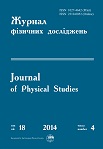DOI: https://doi.org/10.30970/jps.07.184
THE INFLUENCE OF LEAD-IMPURITY ON RADIATION HARDNESS OF SILICON SINGLE CRYSTALS
V. B. Neimash{1}, M. M. Krasko{1}, A. M. Kraitchinskii{1}, V. V. Voitovych{1}, V. V. Popov{2}, A. P. Pokanevich{2}, M. I. Gorodyskii{2}, O. M. Kabaldin{3}, V. M. Tsmots'{3}
{1}Institute of Physics Nat. Acad. Sci. of Ukraine, Kyiv, 03022, Ukraine
e-mail: vova@neimash.kiev.ua,
{2}‟Mikroanalitycs" Center, Kyiv, 03022, Ukraine
e-mail: popovmc@i.kiev.ua,
{3}Joint Solid-State Microelectronics Laboratory of Nat. Acad.
Sci. of Ukraine
and the Ministry of Education and Science of Ukraine at
Drohobych Ivan Franko State Pedagogical University
24 Franko Str., Drohobych, 82100, Ukraine,
e-mail: administrator@drohobych.net
